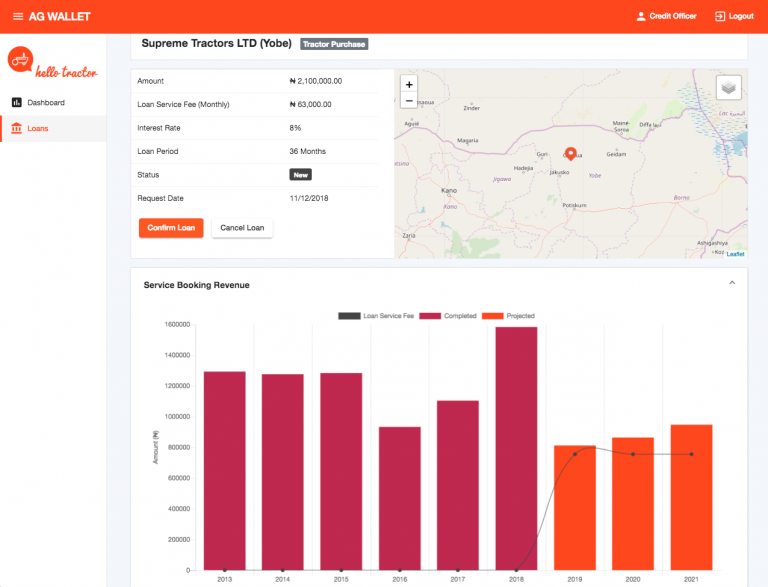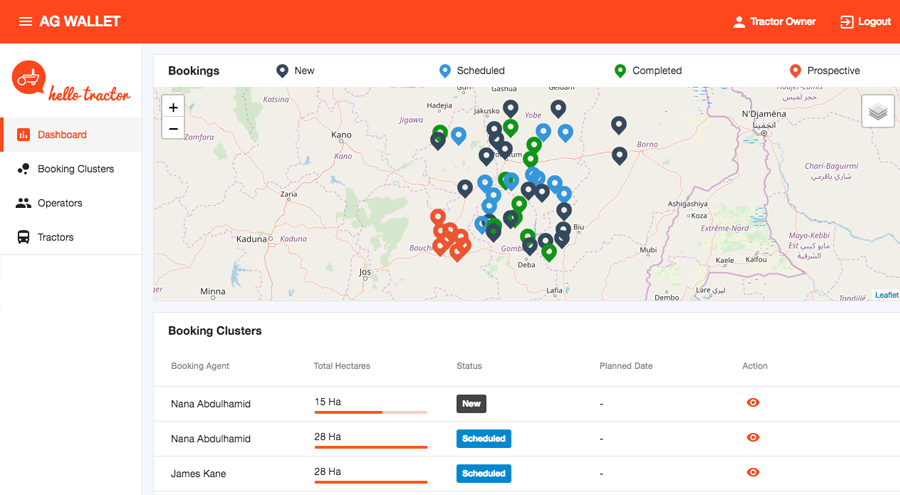The project was announced at TechCrunch Battlefield in Lagos, Nigeria.
In sub-Saharan Africa, more than 60 percent of crops are managed manually, with less than 20 percent managed by tractors and other machinery, an unsustainable model as food demand increases due to population growth averaging 11 million per year. In addition, up to 50 percent of farmers suffer post-harvest losses annually due to poor planting practices.
This was the motivation behind startup Hello Tractor, a mobile platform that enables farmers to access tractor services on demand. Using a mobile app, the service aggregates tractor service requests and pairs them with recommended tractors and operators, while simultaneously tracking how many hours each piece of equipment is in the field and area serviced.

Hello Tractor partners with companies like John Deere to increase mechanization access in small farming communities and plans to add additional services including predictive fleet utilization and maintenance; operator and tractor scoring; financing; and crop yield forecasting. This is where IBM Research – Africa comes in.
Scientists at our lab in Kenya are working with Hello Tractor’s developers to apply several technologies including the Watson Decision Platform for Agriculture, blockchain, the Internet of Things (IoT) and IBM Cloud, to the app.
The magic behind the idea is what we call an agriculture digital wallet, a blockchain-enabled and AI-based decision support platform that enables capturing, tracking, and instant sharing of data, while creating end-to-end trust and transparency for all the parties involved across the agribusiness value chain.
More specifically, the pilot will address a broad cross-section of the agriculture industry:
- Farmers: Machine learning will help farmers predict crop yields. The data, combined with advanced analytics and blockchain, can be mined to develop a credit score for loans by predicting the value of a harvest. Forecasted weather data from The Weather Company (an IBM business), remote sensing data (e.g., satellite) and IoT data from tractors will also be incorporated into the app to help small farmers know when to cultivate, the quality of their farm cultivation, what to plant, and what fertilizer to use. In the future, IBM AgroPad technology, developed at our lab in Brazil, could also be incorporated to determine soil quality.
- Tractor Fleet Owners: Using machine learning and the IoT, fleet owners will be able to view and manage fleet utilization and predictive maintenance as well as forecast future tractor utilizations based on history, real-time weather data, and remote sensing satellite data. Using a five-star rating system, tractor operators will be ranked and utilized based on their training (e.g., plowing, deep ripping, harrowing, fertilizing). Owners will also have financing opportunities for maintenance and for buying new tractors and implements based on historical data.
- Tractor Dealers: Dealers can benefit from improved tractor repair and servicing, after-sales support, spare part inventory planning and credit administration.
- Banks and Financial Institutions: Banks and financial institutions can view and track utilization of tractors to determine a credit portfolio for farmers and tractor owners, while also evaluating forecasted utilization to make credit decisions for tractor owners based on verified and trusted data on the blockchain.
- Governments: Governments can utilize data and actionable insights for various decision support capabilities including structuring incentives, enforcing regulations, prioritizing investments and making policy decisions.
Our vision is to leverage AI, blockchain and the IoT to digitize, optimize and streamline agricultural business processes, creating efficiencies and new services from farm to fork around the world. More specifically, the blockchain will provide a tamper-proof definition of demand-side and supply-side workflows from tractor request to fulfillment, payment for services, and distribution of proceeds, authorized access to services and documents within the workflow, logging of all workflow-related approvals including booking, invoicing, etc.).
For the next phase of the project, IBM researchers and Hello Tractor engineers are looking to use machine learning with image recognition to predict the quality of cultivation. For example, remote sensing data combined with weather data could be used to predict the next harvest. Plans are also underway to expand the platform beyond Nigeria to Kenya, Mozambique, Senegal, Tanzania, Pakistan and Bangladesh.
The new services will be tested in a pilot starting in the first half of 2019.


















